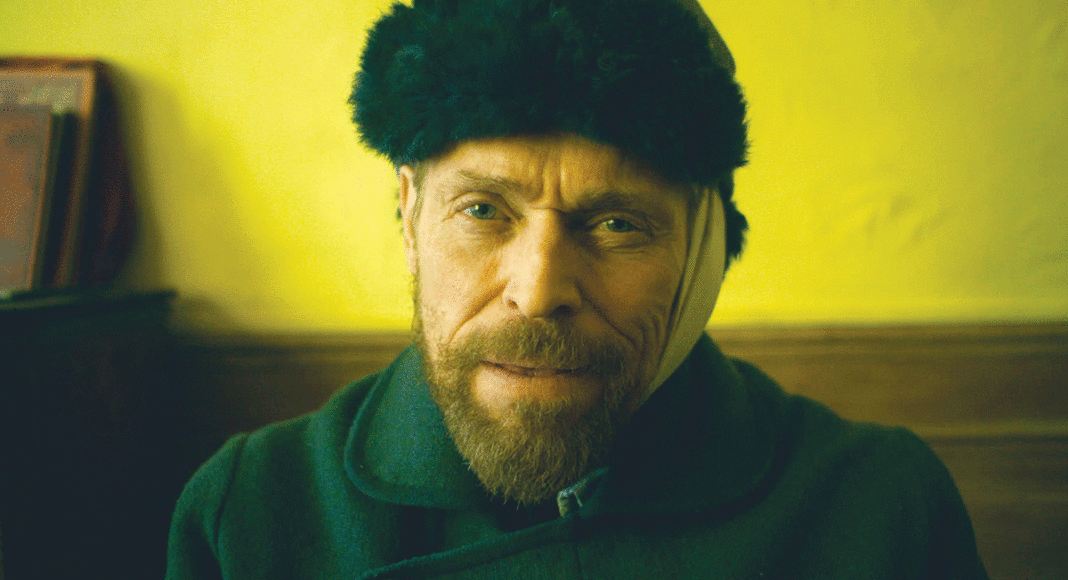If you’re looking for a portrait of artistic torment and isolation from the inside-out, look no further than At Eternity’s Gate. The subject is Vincent van Gogh in the last years of his life, impoverished and churning out his delirious canvases with no encouragement whatsoever in the sun-splashed rural village of Arles in the South of France. Directed by artist-turned-filmmaker Julian Schnabel, it’s more like a feverish plunge into the act of creation itself than a conventional biopic about the facts of Van Gogh’s life.
This is familiar territory for Schnabel, who’s drawn to stories about creative people in conflict with society (Before Night Falls, Basquiat, The Diving Bell and the Butterfly). What Schnabel gets absolutely right in Eternity’s Gate is the way Van Gogh’s single-minded hunger to get what he calls his “visions” of life (especially nature) down on canvas isolates him from the townspeople who don’t understand his unconventional pictures, and see him as a dangerous lunatic.
To this end, we often see landscapes, objects, and people in the movie through a slightly distorted camera lens, trying to approximate that woozy, dreamlike state in which we all believe Van Gogh must have painted. Outlines are sometimes blurry, contrasting colors often shockingly vivid. In one lovely shot, Van Gogh (played with manic fervor by Willem Dafoe) sprawls, embraced and half-obscured by huge fronds of green and gold wheat, as if he’s becoming one of his paintings.
But this subjective view from the artist’s perspective has its drawbacks, too. The camera is in constant, reeling motion, especially in the first half-hour or so, so pack your Dramamine if that sort of thing affects you. And when we’re not seeing things through Van Gogh’s eyes, Schnabel invites us to commune with the artist’s neverending angst and mania through extreme close-ups of Dafoe’s furrowed, sunken cheeks and unnaturally bright eyes, a portrait of torment that can get a little claustrophobic—especially when juxtaposed against dull ochre and poison green interiors borrowed from Van Gogh’s paintings.
The good news is Dafoe can be utterly mesmerizing, and Schnabel has assembled a stellar cast in supporting roles. Oscar Isaac is quite good as Paul Gauguin, who is at first Van Gogh’s compatriot and mentor in Arles; they debate painting what the artist sees instead of real reality. But their relationship starts to fray when Gauguin’s advice to work slowly and build the canvas clashes with Van Gogh’s insistence that a painting must be done fast, “in one clear gesture.” (Schnabel also turns Gauguin into a seer, telling Van Gogh, “The people in your portraits will be famous because you painted them, not because of who they are.”)
Rupert Friend has a couple of touching scenes as Van Gogh’s loyal brother, Theo, and Diving Bell alumnus Mathieu Amalric has a winsome moment as the benevolent asylum doctor immortalized in Van Gogh’s “Portrait of Dr. Gachet.” Mads Mikkelsen has one scene as a stoic priest disputing Van Gogh’s claim that his bizarre painting style is “a gift from God.” Van Gogh’s response—“Maybe God made me a painter for people who aren’t born yet”—also seems sort of jarringly prescient (although much of Van Gogh’s dialogue and his occasional voice-over observations are culled from his well-documented letters to Theo).
Schnabel’s storytelling fails in two key emotional scenes in which a confrontation or confession plays out, immediately followed by the exact same dialogue, while Van Gogh sobs or looks stricken. It’s an annoying device that stops the narrative cold and suggests Schnabel didn’t trust us to understand what was going on the first time. It also calls attention away from the drama onscreen to the filmmaker himself.
Still, the movie offers some arresting images (a frosty field full of dying sunflower stalks), and thoughtful insights into the creative life. (“I paint to stop thinking,” Van Gogh tells Theo.) But for all of Schnabel’s determined technique, nothing in his movie ever quite achieves the emotional clarity of a single Van Gogh painting.
At Eternity’s Gate
**1/2 (out of four)
With Willem Dafoe, Oscar Isaac, and Rupert Friend. Written by Jean-Claude Carriere, Louise Kugelberg and Julian Schnabel. Directed by Julian Schnabel. A CBS Films release. Rated PG-13. 110 minutes.














